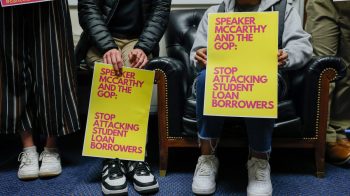Poll shows majority of Americans want debt ceiling compromise
Poll shows majority of Americans want debt ceiling compromise
Kai Ryssdal: There were more debt limit machinations in Washington today. The White House seemed to threaten a veto of the plan House Speaker John Boehner offered yesterday. In a statement a couple hours later, though, the administration downgraded its language to “strongly opposing” the Boehner plan.
Our Washington bureau chief John Dimsdale has the very latest on the day’s events.
John Dimsdale: The president and Republican leaders spent two hours trying to reach an agreement to extend the government’s authority to borrow for a few weeks while details of the budget are debated. In the end, Senate Majority Leader Bob Dole said the president would not agree to a balanced budget in seven years in return for a debt ceiling increase.
Bob Dole: The president made it very clear upfront.
Yeah OK, so, no, that wasn’t today. Dimsdale’s been around for a while. That was a debt limit story from 16 years ago — Marketplace, Nov. 1st, 1995. The more things change, huh?
What hasn’t been changing as this debate has drawn out — just this debate, not the once since 1995 — is how Americans feel about it. Carroll Doherty is the associate director of the Pew Research Center for the People and the Press. Mr. Doherty, welcome to the broadcast.
Carroll Doherty: Good to be here.
Ryssdal: Well let’s get right to it: How do the American people feel about this whole debt thing?
Doherty: Overwhelmingly, the public says: get a compromise done, even if it means on a package that I disagree with. That’s what Americans are telling us — 68 percent are saying lawmakers who agree with them should be willing to compromise even on a package that they don’t necessarily agree with.
Ryssdal: And yet, what we hear from Washington is members from one party saying, the American people will not stand for benefit cuts; and members of the other party saying, we will not have tax increases.
Doherty: Well the public is acknowledging that a little of both is needed. I mean, they’re not specific about the deal, and of course there’s disagreements about various aspects of it, but we still get a consistent 60 percent saying that this deal would have to include — or any way to reduce the budget deficit — would have to include some tax increases and some spending cuts. That’s been a consistent finding from our polls since last December.
Ryssdal: Can you break it down for me along party lines — Democrat versus Republican?
Doherty: Certainly more support among Democrats: 81 percent support for a compromise; adverse is 53 percent of Republicans. But that 53 percent, within there, there’s a huge divide in the Republican Party between those who support the Tea Party and those who don’t. In fact, 53 percent of Tea Party supporters say: stand on principle, even if it means a default.
Ryssdal: Let me follow up on that number about the Tea Party, though. It does seem that they are having a disproportionate influence on this debate, right?
Doherty: Well, they’re an important segment of the Republican Party at this point. In fact, they’re very engaged. They were very crucial to the 2010 outcome. And 53 percent of those Tea Party Republicans are saying no deal, and that’s a very important number.
Ryssdal: Where do you suppose politicians get their figures when they say the American people want this and the American people want that? I mean, are they just making it up?
Doherty: I suppose that they take it from the polls, but I’m sure they do a selective reading of the polls that supports their own side. That’s typically what we see, although most lawmakers and politicians insist that they don’t read the polls. I’m sure they do.
Ryssdal: Are we still optimistic that we will have a deal at some point?
Doherty: That may be one of the most surprising findings in our poll, that 56 percent still say that President Obama and Congress will resolve this by the Aug. 2nd deadline. That’s no different than a Washington Post-ABC poll from last week. So the optimism hasn’t declined, even though there’s been this back-and-forth and missed signals and negotiating problems.
Ryssdal: One of the things that’s happening in Washington, as this debate has dragged on, is that other economic policy issues have been crowded out. We’re not hearing a lot about jobs, we’re not hearing a lot about education or immigration policy, any of those things. Is the debt ceiling the American people’s biggest economic worry?
Doherty: Not at all — it’s still jobs. Thirty-nine to 29 percent still say that the jobs situation is the economic issue that worries them most — that has not changed since May. The budget deficit number has been rising over the past several months until May, but since May, there’s been no change at all.
Ryssdal: Carroll Doherty is the associate director of the Pew Research Center for the People and the Press. Mr. Doherty, thanks so much for your time.
Doherty: Thank you.
There’s a lot happening in the world. Through it all, Marketplace is here for you.
You rely on Marketplace to break down the world’s events and tell you how it affects you in a fact-based, approachable way. We rely on your financial support to keep making that possible.
Your donation today powers the independent journalism that you rely on. For just $5/month, you can help sustain Marketplace so we can keep reporting on the things that matter to you.


















